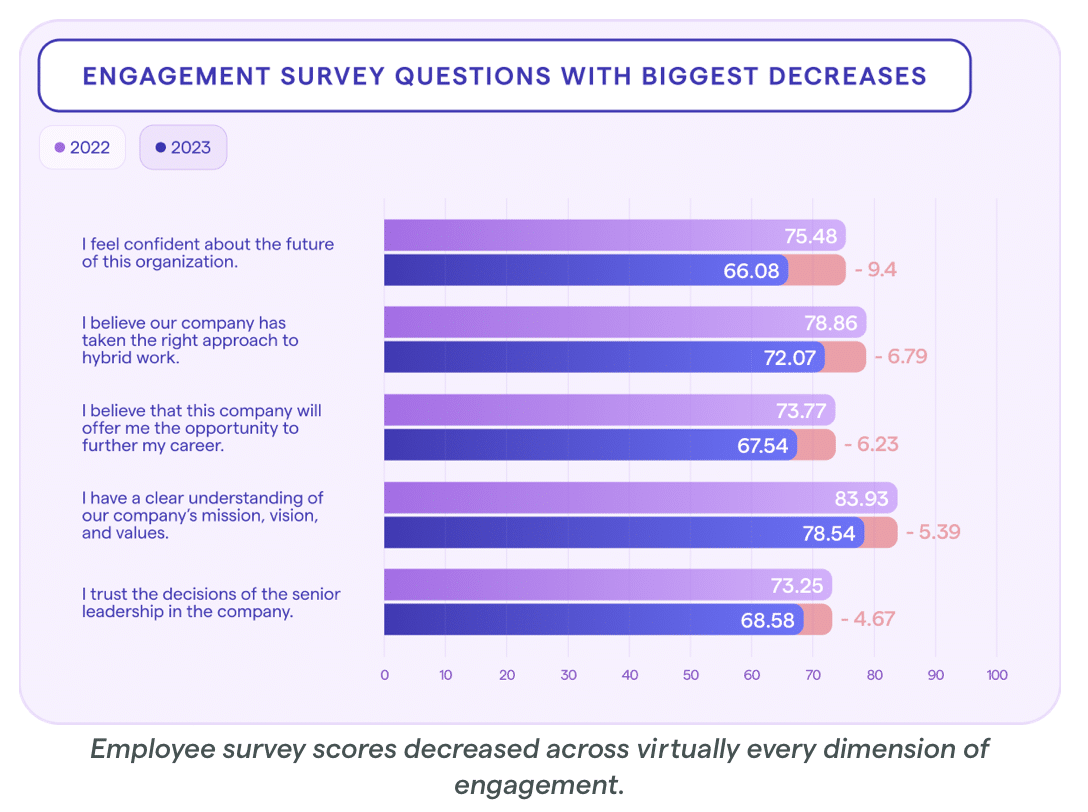Staying updated on the latest workforce trends is crucial for TA leaders and HR professionals. This week, we delve into three significant developments shaping the talent landscape and get SocialTalent CEO, Johnny Campell’s first-hand takes on these pieces.
- First, Arctic Shores’ new playbook for skills-based hiring offers a pragmatic approach to navigating the evolving recruitment process, emphasizing the importance of skill sets over traditional qualifications. Is it a worthwhile guide? As Johnny Campbell states: “I’m a big fan of the skills-first movement, but I think it’s been completely misrepresented here.” Read more below!
- Lattice’s recent data reveals concerning trends of lower employee engagement and increased managerial burdens, highlighting the need for effective leadership and support. “It’s all part of the middle-management crisis,” Johnny says, “and this is a direct result of cost cutting from inflation.”
- And lastly, as another “Great Reshuffle” looms, LinkedIn advises companies on how to adapt to the anticipated shifts in talent acquisition, ensuring preparedness for the changing job market as employees look set to leave after a period of low attrition. While Johnny doesn’t think it will get back to post-pandemic levels, it is going to rise and there will be a lot more recruiting.
Join us as we explore these pivotal insights and their implications for the future of work.

1. The Pragmatist’s Playbook for Skills-Based Hiring
Source: Arctic Shores
Arctic Shores’ “The Pragmatist’s Playbook for Skills-Based Hiring” offers a comprehensive guide to modernizing recruitment practices by focusing on candidates’ skills rather than traditional qualifications. The playbook emphasizes the importance of defining clear skill requirements, using objective assessment tools, and fostering a culture that values continuous learning and development. It also provides practical steps for implementing skills-based hiring, including how to identify key skills, create relevant job descriptions, and evaluate candidates effectively. By adopting this approach, organizations can build more diverse, agile, and capable teams, better prepared to meet the evolving demands of the business world.
Johnny Campbell’s take on this:
“This is a LONG playbook – 74 pages to be exact, so I’m not sure how pragmatic this really is! Some amazing experts have contributed to this piece and I’m a big fan of the skills movement, but is this a good guide on skills-based hiring? I actually think it’s been completely misrepresented…
The article overemphasizes personality trait assessments for all candidates in skills-first hiring, which I disagree with. It presents a false “this or that” choice between skills and qualifications, but it’s really a blend that varies by role. For example, doctors and lawyers need qualifications and academic backgrounds, while many sales roles don’t require degrees or extensive experience. Experience is valuable but must be combined correctly with skills. The article promises the ultimate solution but falls short and seems commercially driven. Worth reading, but keep in mind they’re selling a product.”
2. Lattice Report: Low Employee Engagement
Source: Lattice
Lattice’s recent report highlights several critical trends impacting workplaces today. First, employee engagement has significantly declined, with key metrics like the Employee Net Promoter Score (eNPS) dropping from 33.33 to 24.8 between 2022 and 2023. Confidence in company futures and satisfaction with leadership have also seen notable decreases. Additionally, managers are increasingly overwhelmed, with their average number of direct reports rising from 4.3 in 2020 to 5.1 in 2023. This growing managerial burden is a key factor in employee burnout.

Johnny Campbell’s take on this:
“This Lattice article highlights some important pieces of research that are very interconnected.
In 2023, massive layoffs across industries led to a media-hyped decline in attrition, with people scared to change jobs. Companies, pressured by inflation to cut costs, turned to newly hired managers from 2021-22 for performance management, causing stress. This stress on teams resulted in managers being shuffled around and managing larger teams with fewer resources. It’s all part of a middle management crisis driven by cost-cutting due to inflation. The data from Lattice supports and proves this narrative.”
3. It’s Time to Prepare for the Great Reshuffle 2.0
Source: LinkedIn
As we approach the “Great Reshuffle 2.0,” companies must prepare for an impending surge in employee attrition as the economy stabilizes. According to LinkedIn, many employees, currently feeling stuck, are expected to seek new opportunities. Leaders should focus on providing career growth opportunities, supporting recruiting teams, and investing in AI technologies to handle increased hiring demands efficiently. Proactive measures, including regular employee role changes and enhancing recruiter tools, are essential to navigate the upcoming shifts in the talent market successfully.
Johnny Campbell’s take on this:
“LinkedIn predicts the “Great Reshuffle 2.0,” and while I’m usually skeptical, Dan Shapiro, a very wise author, makes some valid points. After the recent period of low attrition following massive layoffs, I believe we’ll see an increase in job movement. It won’t return to post-pandemic levels, but it will rise, leading to more recruiting and activity as Dan predicts.
No one knows exactly when this will happen, but my opinion is that it won’t occur until after the US election in November. The country is waiting to see the outcome before resuming normal hiring and job changes. So, while the timing is uncertain, I agree with Dan that a 2.0 Reshuffle is coming.”
Stay up-to-date on all things hiring and talent! Follow SocialTalent’s LinkedIn and sign-up to our weekly newsletter!
The post Talent News Round-Up: Skills-Based Hiring, Low Employee Engagement, and The Great Reshuffle appeared first on SocialTalent.